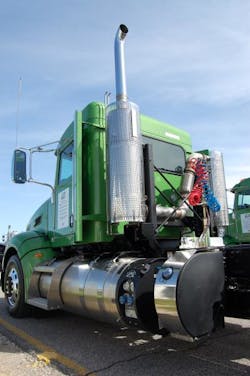There is no doubt that U.S. is experiencing an energy revolution of sorts, one increasingly based on natural gas that’s being extracted from shale deposits across many part of the country.
Yet the U.S. freight transportation industry – and especially trucking – is seeing some particularly big benefits from this “energy revolution” as well; an impact chronicled in a new report issued by global consulting firm PricewaterhouseCoopers (PwC) appropriately entitled Shale Energy: Implications for the U.S. transportation & logistics industry.Jonathan Kletzel (at right), PwC’s U.S. transportation and logistics leader, noted that since 2010, the U.S. has emerged as the largest gas producer in the world – so much so that the Energy Information Administration (EIA) forecasts that by 2040, 50% of our nation’s natural gas supply will come from shale gas, dramatically impacting several segments of the transportation and logistics industry.
“Shale energy is having a major effect on the chemicals and manufacturing industries in the U.S., with clear ramifications for transportation and logistics companies,” he explained. “This new source of abundant, low-cost energy provides a significant incentive for chemical producers and manufacturers to shorten their supply chain and bring production facilities back to the U.S. A revived manufacturing sector would increase the need for rail and trucking to move more products domestically and to ship exports abroad.”
I luckily grabbed Jonathan by email this week (he’s constantly traveling to and from meetings all over the place it seems!) to talk about PwC’s findings about where shale gas and trucking intersect the most.
“We don't have a percentage estimate as it's a moving target, with some of the non-pipeline transportation volume getting displaced as more pipeline is built,” he told me. “The rail segment is having a hard time keeping up with the production of rail cars to transport liquids – oil, gas, chemicals – and the pipelines are coming around too slowly so there is an issue with demand outstripping supply.”
That right there, he stressed, should provide trucking some opportunity to capture market share, assuming motor carriers as well don’t suddenly start experiencing a dearth of liquid trailer capacity.
“In addition, transportation share varies significantly by shale play due to existing pipeline infrastructure, and the various lead times needed for approvals and construction of new pipeline near each formation,” Jonathan explained to me. “Pipeline will likely continue to be regarded as the more economical mode for energy transportation over land; however, trucking gets points for its flexibility as it is not limited by existing pipe or track infrastructure. This gives trucking a significant opportunity in particular near the newer production sites.”
He also noted on a separate track that the low price of liquefied natural gas (LNG) relative to the more expensive diesel fuel is leading many carriers to switch to vehicles that run on natural gas – another potential boon from the U.S. shale gas boom.“However, in order for trucking companies to expand their use of more affordable fuels, there needs to be infrastructure support,” Jonathan stressed. “As part of America’s Natural Gas Highway initiative, a network of approximately 150 LNG truck fueling stations on interstate highways is scheduled to be in operation by the end of 2013. In addition to changing fuel dynamics, trucking activity has increased as a result of shale production as trucks haul fresh water, frack sand, waste products and heavy equipment.”
Of course, when you’re taking about shipping any combustible substance – and natural gas is surely that – carriers will need to keep safety issues foremost in mind.
“There is some risk of transporting natural gas by truck and since the derailment in Canada, there has been talk of requiring more reinforcement on rail cars that haul hazardous liquids,” Jonathan told me. “If LNG spills it can burn as long as there is a source of ignition combined with a sufficient concentration of the gas, which has contributed to some local opposition to opening up new truck routes. The main concern has tended to focus on transporting through busier, more densely populated areas, but we expect that there will be more regulatory scrutiny in this area.”
Then there’s the final question: how long might this “boom” last? “Pipelines could be expected to take share in transportation from well sites as they get built, but trucking is likely to keep much of its share of frack sand and water transport,” Jonathan said. “However, companies should keep an eye on efforts to change regulations, which could allow transport of wastewater by barge as this may lead to another substitute to trucking for these volumes.”
Something to keep in mind as the shale boom rolls on.


